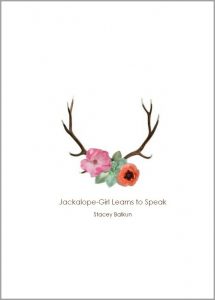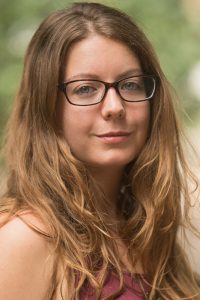On Place: Stacey Balkun
The Poetics of Place: On Writing Memory as Imagination
 Place lives half in the imagination. We hold place in the palms of memory and expectation; it’s never quite how we remember it or what we wish it. We don’t see the place that’s physically before us but rather what we believe and feel, our experience with place tinted by our emotional memory.
Place lives half in the imagination. We hold place in the palms of memory and expectation; it’s never quite how we remember it or what we wish it. We don’t see the place that’s physically before us but rather what we believe and feel, our experience with place tinted by our emotional memory.
As a child, I loved the Box Car Children. I lived them, playing in the woods behind my suburban home. I didn’t see that small stand of trees as merely a buffer between our housing development and the freeway; to me, it was an enchanted forest. My friend and I spent our afternoons building a tree house and splashing in the little stream, pretending to cool bottles of milk in its water or drawing maps of our kingdom on the backs of envelopes discarded by our parents.
Our relationship to place is informed by the narratives in our lives; as a child, those narratives for me were stories: The Boxcar Children, Beauty and the Beast, Nancy Drew. Like the characters of these tales, I craved some dramatic reason to be out there in the woods, alone or with a best friend. I wanted the responsibility with which the young protagonists of my books were so often saddled, though I can’t explain exactly what or why: to be brave in the face of danger? To care for a family or battle crime? All of these narratives had an allure, perhaps because they so contrasted with my small experience in a small neighborhood in a small town.
There was one farm left in the town at that time. It had a stable and a farm stand. Its property included a much larger woods full of horse trails that led right up to the dumpsters behind the ShopRite Center. Within a few years, some of that land would become a new strip mall with a mattress store and a Starbucks. Soon the county would try to buy the family-owned farm to make condos, but when they wouldn’t sell, somehow passed a law declaring the acreage “open land,” removing the family and chickens and horses and effectively creating an empty, rundown lot with a huge, smelly puddle full of geese.
Place is a mirror. Unlike the murky goose pond, we can look at it to see ourselves reflected back. In poetry, a writer can capture both reflection and reality. Where upon first glance we may only notice a concrete sound barrier or a dead end, our characters can see magic and possibility. The white pines may be as lonely as our speaker, waiting as she is for that last school bell signifying the return of a friend.
To tell these stories and delve into these memories within my poetry, I turned to domestic fabulism, that space between the magical real and most familiar. I created a best friend named Apple-Child, a girl born from a tree. With her, my speaker roams the woods of my childhood, growing into adolescence as suburbia creeps into the shrinking acres of trees. In these poems, imagery and story are manipulated, allowing for a more complete and nuanced study of place. The reader realizes, without being told outright, that the wildness of this place exists merely in the characters’ heads; that in reality, these woods are anything but dangerous.
The introduction of a fantastical element like Apple-Child allows the poems to move beyond nostalgia, memory, and mere description of place. We can give ourselves permission to write how we remember it or what we wish it, letting the familiar world slip into the imagined and allowing ourselves to see the magic that so enveloped us in the first place.
***
 Stacey Balkun is the author of Jackalope-Girl Learns to Speak (dancing girl 2016) & Lost City Museum (ELJ 2016). She has been named a Finalist for the 2016 Faulkner Words of Wisdom Poetry Contest, the 2016 Two Sylvias Poetry Chapbook Prize, the 2016 Event Horizon Science Poetry Competition and the Center for Women Writer’s 2016 Rita Dove Award. Her work has appeared in Crab Orchard Review, Gargoyle, Muzzle, and Bayou, among others, and she holds an MFA from Fresno State. A 2015 Hambidge Fellow, Stacey served as Artist-in-Residence at the Great Smoky Mountains National Park in 2013. She is the Chapbook Series Editor at Sundress Publications and teaches poetry online at The Poetry Barn. Visit her at www.staceybalkun.com.
Stacey Balkun is the author of Jackalope-Girl Learns to Speak (dancing girl 2016) & Lost City Museum (ELJ 2016). She has been named a Finalist for the 2016 Faulkner Words of Wisdom Poetry Contest, the 2016 Two Sylvias Poetry Chapbook Prize, the 2016 Event Horizon Science Poetry Competition and the Center for Women Writer’s 2016 Rita Dove Award. Her work has appeared in Crab Orchard Review, Gargoyle, Muzzle, and Bayou, among others, and she holds an MFA from Fresno State. A 2015 Hambidge Fellow, Stacey served as Artist-in-Residence at the Great Smoky Mountains National Park in 2013. She is the Chapbook Series Editor at Sundress Publications and teaches poetry online at The Poetry Barn. Visit her at www.staceybalkun.com.
Leave a Reply